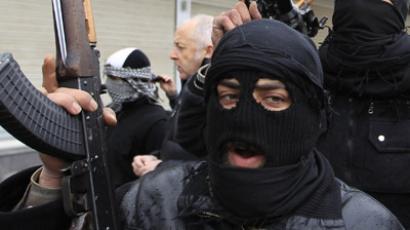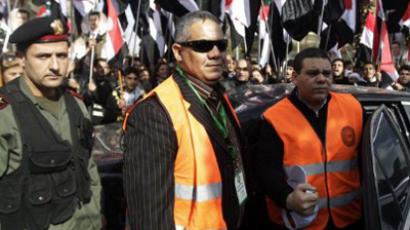Deaths in Syria: Counting them (politically) correctly
High casualty numbers in Syria are reported daily by the media, even though a blackout makes them unverifiable. Things became murkier after a human rights site, which enjoyed frequent citations, split in two and began giving conflicting reports.
The British-based Syrian Observatory of Human Rights (SOHR) is one of the most widely-quoted sources of Syrian casualty figures. However the group is currently experiencing an ownership row, which has left media outlets wondering how reliable this source is.
Currently there are two sites, each claiming to be the official Observatory. The original one is in Arabic with an English version on Facebook. The splinter site was launched in December, with most posts in English. Both call each other impostors.
They give different casualty reports – and a very different perspective of the crisis. The original site’s latest figures show just over 5,100 civilian deaths against almost 2,000 military casualties. The rival site claims well over 6,500 civilians have been killed and barely 600 troops.
The numbers are not the only thing the two SOHR groups differ on though. Politics seems to be at the core of the split.
The man behind the new site is Mousab Azzawi. He launched a smear campaign against the original Observatory co-founder Rami Abdulrahman. Azzawi revealed Abdulrahman’s real name and said his rival was linked to the Assad family, is unprofessional and barely related to the Observatory. He also accused the rival of hijacking the original site by changing all logins and passwords.
The original Observatory says Mousab Azzawi used to translate for them, but then was fired after he falsely claimed to be an official spokesman for the group and called for foreign intervention into Syria.
RT’s Ivor Bennet spoke to Hivin Kako, who is spokesperson of the original SOHR. “Azzawi group tried to pass some political view like calling for a no-fly zone and international intervention. We made it clear that we are against an intervention; we are against a no-fly zone. All we need is to stop the bloodshed that is going on in Syria,” she said.
Azzawi refused to speak on camera, stating, "I cannot waste my time talking about this at the moment whilst people are dying in Homs. They are my priority right now."
He did refer RT to another opposition group based in London, the General Commission of the Syrian Revolution. They too refused to comment on the ownership row over the Observatory. But the allies of Azzawi’s site did confirm that reporting the deaths of the Syrian government loyalists was not in their interest.
A local freelance journalist described to RT the conflicting information coming out of the city of Homsto. Following activists’ claims of heavy shelling from the government forces, officials made a statement refuting these allegations to her.
“…they have not used any heavy bombs on the city; in fact they said some RBG’s were launched from the neighborhood of Bagal Amar to a surrounding area in the city of Homs,” she said.
She also spoke to a member of the National Coordination Council, who “stated that they are going to put forward a plan of negotiations asking the regime to cease fire on their side, maybe to allow some time for the regime to pull out the bodies from the city and regions affected.”
Bitter divorce over politics
Abdulrahman says the whole conflict stems from an internal dispute in the Syrian opposition, reports the Al-Akhbar news website. He and his group have been attacked by those in the anti-Assad activists, who want NATO to invade the country, similar to what happened in Libya. They also want the SOHR not to report the deaths of government loyalists to make the case for an intervention.
But Abdulrahman’s site is not free from criticism either. It says it relies on a network of informants to provide casualty reports, but since the country is closed to foreign media, those are impossible to verify independently.
In August 2011 it circulated a report that newborn babies in a Hama hospital had been deliberately killed after their incubators were switched off by regime forces during a military crackdown on the city. The report was branded a hoax by critics, who were quick to point out its striking resemblance of a similar story told about Saddam Hussein’s invasion in Kuwait. As it later turned out, the tale originated as false testimony by the daughter of the Kuwaiti ambassador to the US, which was used by politicians to justify military action against Iraq.
Critics say both brands of the SOHR are ultimately propaganda vehicles of the opposition.
“Frankly I don’t think the people even using these figures have any objectivity. They have an agenda, a clear agenda. It’s to justify, by any means possible, that Assad’s regime is a brutal massacring regime and it needs to fall as soon as possible. And we can see at the UN when that human rights strategy for regime change doesn’t work how annoyed Western governments have got,” freelance journalist Sukant Chandan told RT.
The UN used the Observatory numbers in their count of the victims of the Syrian riots. However it said recently it stopped counting claiming it is too difficult to verify. The UN High Commissioner for Human Rights Navi Pillay said 5,000 civilian deaths should be enough to provoke international action. However there is no quick an assured way to make peace in the country, where too many interests clash and too many grudges are held by the combating parties.














